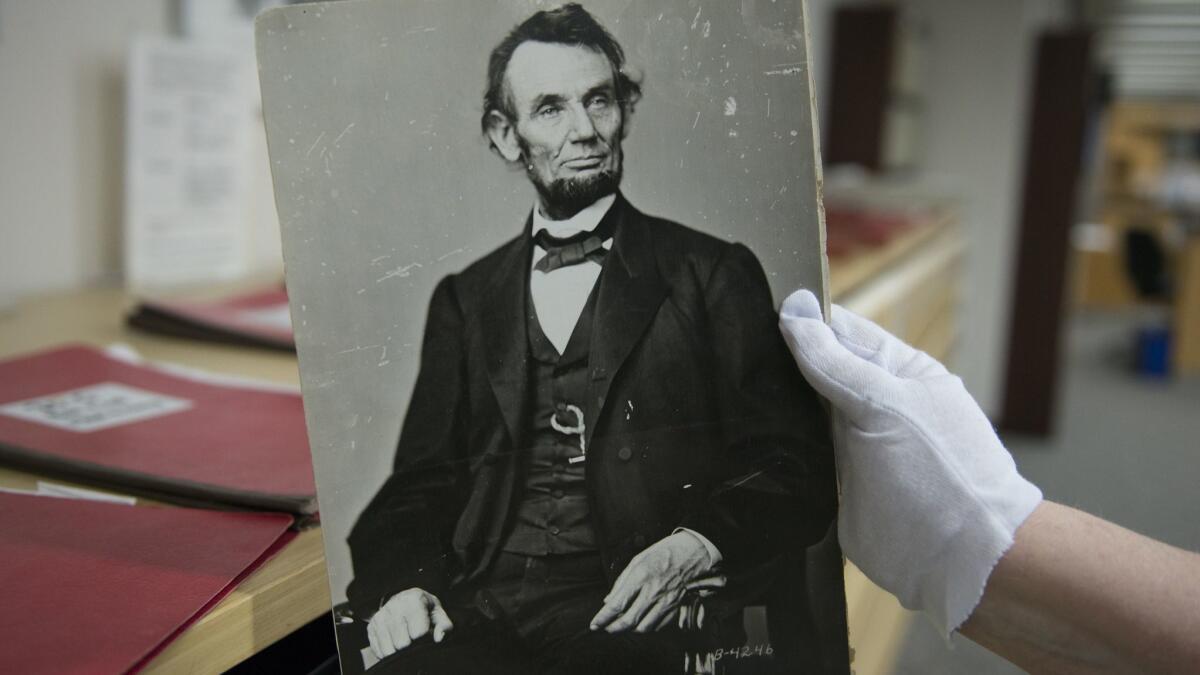Op-Ed: Todayâs leaders should ask themselves: What would Lincoln do?

Abraham Lincoln, who was born 210 years ago today, was president during an era even more rancorous and polarized than our own. Yet he managed to navigate it â not in a way that pleased everyone or made him popular, but rather by keeping the good of the country always in his sights.
His path has lessons for todayâs leaders.
Lincolnâs political philosophy consisted of only a few ideas, and he believed that America itself was based on these ideas. He said in 1861 that he had ânever had a feeling politically that did not spring from the sentiments embodied in the Declaration of Independence.â In the same speech, he articulated what he believed to be the core promises of that document: that âlibertyâ was the American birthright and that in America and ultimately in the world âall should have an equal chance.â
He spoke of democracy the way the poet Walt Whitman did, as both our nationâs form of government and its special reason for existing.
Amid conflict, Lincoln sought conciliation. Amid anger, he advocated âcharity for all.â Amid despair, he summoned âthe better angels of our nature.â
As is the case today, many of Lincolnâs contemporaries were hyper-partisan, treating politics as a constant contest between good and evil. Lincoln believed differently. As he put it in an 1848 speech, in politics âthere are few things wholly evil or wholly good,â which means that âgovernmental policyâ must typically be âan inseparable compound of the two.â As a result, even in his darkest moments, he looked for good in the ideas of those who disagreed with him, and he expected them to do the same.
This way of thinking meant that Lincoln never treated opponents as enemies. Even during the Civil War, he did not demonize Southerners or the South. He did not view those fighting on the other side as evil.
Jefferson Davis, president of the Confederate States of America, was Lincolnâs opposite in many ways, including in temperament. In 1861 he said of Northerners: âOur people now look with contemptuous astonishment on those with whom they had been so recently associated.â Lincoln did not think or talk that way. Nor did he respond in kind to personal attacks, even as they rained down on him without cessation.
In 1865, when Lincoln delivered his second inaugural address, the Civil War was nearing an end, and he was already thinking about how âto bind up the nationâs wounds.â In that same address, when he urged âmalice toward none,â he meant it.
Throughout his political career, Lincoln rejected dogmatism, embraced pragmatism, and sought compromise, something that often didnât sit well with those he considered his allies.
Lincoln was often accused of being noncommittal, of seeming to want things both ways. He would infuriate colleagues by telling them, âMy policy is to have no policy.â He would change his mind, vacillate, and propose half-measures that displeased everyone. Many around him viewed him as weak.
Within his own party, the âRadical Republicans,â those most fervently opposed to slavery, never trusted him. Lincoln, in turn, considered them unreasonable zealots. He complained to his secretary that they were âutterly lawlessâ and âthe unhandiest devils in the world to deal with.â But he also could admire their idealism and recognize their goodness, explaining to his secretary that âafter all, their faces are set Zionwards.â
Enter the Fray: First takes on the news of the minute Âť
Lincoln chose humor over vitriol and understanding over judgment. He liked telling stories more than delivering lectures and making suggestions more than issuing orders. A strong, confident man, but one who also experienced dark depression, Lincoln was mild-mannered. His capacity for empathy was striking to those around him.
Lincoln had important flaws, but was providentially suited to his times. In a time of disunity, he tried to remind Americans what united them. Amid conflict, he sought conciliation. Amid anger, he advocated âcharity for all.â Amid despair, he summoned âthe better angels of our nature.â
On his birthday, todayâs leaders would do well to contemplate his wisdom.
David Blankenhorn is president of Better Angels, an organization bringing together red and blue Americans to depolarize America.
More to Read
A cure for the common opinion
Get thought-provoking perspectives with our weekly newsletter.
You may occasionally receive promotional content from the Los Angeles Times.










